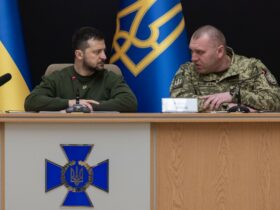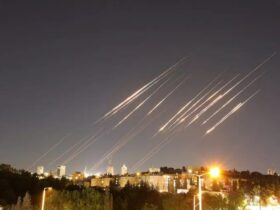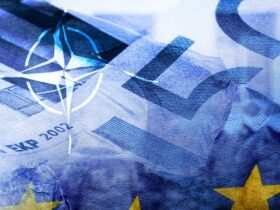On April 27 Haftar declared himself the ruler of Libya. In a video message, Haftar pointed to street demonstrations in areas under his control, and claimed he “accepted the mandate of the Libyan people” to govern the country. He said the agreement, signed by the warring sides in Libya under the auspices of the UN, has “lost its rule.”
Hafter kendisini Libya’nın başkanı ilan ettihttps://t.co/bKMjD2Ar0N #Libya #Hafter pic.twitter.com/BZD5lCnejS
— Aydınlık ???????? #EvdeKal (@AydinlikGazete) April 28, 2020
Americans are playing both sides in Libya, trying to influence both parties to the conflict
With the resumption of the conflicts and the rising tensions in recent days, the Libyan issue was back on the agenda of both Turkey and the world. Security sources in the region are also reporting an American presence in Libya, while the Turkish Armed Forces are in support of the Government of National Accord (GNA).
Related sources point out recent close cooperation between the Libyan National Army, led by Khalifa Haftar, and US representatives. These contacts are being made under the auspice of the necessity of fighting against global terrorist organizations operating in Libya.
#Haftar: the road to #dictatorship and collapsehttps://t.co/0CVpzy9KmT #Libya #Tripolitania #Fezzan #Cyrenaica #Saleh #GNA #Sarraj #LNA #Turkey
— United World International (@uwidata) April 27, 2020
US operational headquarters at the Benina Air Base
According to regional sources, more than 50 personnel are operating within the territories under Khalifa Haftar’s control, belonging to the US secret services and special forces.
The operational headquarters of the US Army is located at Benina Air Base in Benghazi with 8 permanent personnel. The headquarters personnel are constantly in contact with the Libyan National Army, their attorney general, the heads of the security forces and the intelligence agencies. Among the tasks, these personnel are tasked to gather and process intelligence and evaluate the process in the interests of the US Army Africa Command.
They are controlling Libyan airspace
The airspace control center of the Benina Air Base is under the control of this unit. This center allows entrance into Libyan airspace and coordinates the movement of all aircraft, including the military transport aircrafts of the United Arab Emirates (UAE), Egypt and Saudi Arabia. There are six American air traffic controllers at the station.
A CIA operations unit is also stationed at the Benina Air Base: 4 intelligence operatives, 2 signals experts and 8 members from the US Army Special Forces. The US Secret Services personnel are conducting active operations within the entire region controlled by the Libyan National Army: Search and recruitment for new field agents and contacting the local military administrations in order to track, capture or eliminate the field commanders of various groups, including some international terrorist organizations, are the main tasks of this unit.
Joint operations with Haftar’s son
On necessary occasions, the operations are conducted with the participation of the 106th Brigade and the 155th Battalion of the Libyan National Army under the command of the Americans. The commander of the 106th Brigade, Khaled Haftar, is the son of Khalifa Haftar. The 155th Battalion is among the most powerful troops of the Libyan National Army. Military drones in the American Military Bases in Sigonella (Sicily, Italy) and Madama (Niger) are also heavily used during these military operations.
Americans in the training camp
Regional sources say the Americans had set up the “Jaheeshin” Bootcamp in the East of Benghazi, where the special forces and anti-terrorism units for the Libyan National Army are being trained. These troops were allegedly used in the Tripoli Offensive. This camp consists of 25 US military personnel: the US Defense Intelligence Agency (DIA) officers (4 personnel), a translator team (6 personnel) and the training staff (15 military officials from the US Army 75. Ranger Regiment).
Training of the Libyan National Army members is conducted in three-week cycles, consisting of shooting training and tactical preparation. It is strictly forbidden for the American trainers to go outside the bootcamp.
Mehmet Perinçek yazdı:
ABD, Trablus’a saldıracak Hafter birliklerini eğitiyorhttps://t.co/baE3Yk9m6Q@MehmetPerincek #ABD #Libya #Hafter pic.twitter.com/DbT77zYSbN— Aydınlık ???????? #EvdeKal (@AydinlikGazete) April 22, 2020
Reinforcements via US cargo planes
American military units in Eastern Libya are operating autonomously. They are reinforced by the delivery of the weapons, military and specialized equipment, while food, uniforms and training equipment are supplied by the US Air Force’s C-130 and C-17 type transport aircrafts to the Benina Air Base once or twice every week.
Efforts to sabotage Ankara-Moscow relations
The security sources in the conflict zone state that cooperation between the Libyan National Army and the United States is intended to directly target cooperation between the Government of National Accord and Turkey. American efforts in the Libyan conflict are further about creating a new dispute between Ankara and Moscow, and sabotaging relations between those two countries.
The sources say that Haftar’s anti-terrorism units, which will launch an offensive against Tripoli in future, have been and continue to be trained directly by Washington. Another important point in this context is that the support of the UAE, Saudi Arabia, and Egypt for Haftar are being carried out under the control of the Americans. These countries are able to send military and technical supplies to the Eastern Libya while Washington “looks the other way”.
❗️Yarın (Pazar) Aydınlık’ta ABD’nin Hafter birliklerini eğittiği üssün ayrıntılarını açıklamaya devam ediyorum. pic.twitter.com/XEikCCLcfD
— Mehmet Perinçek (@MehmetPerincek) April 25, 2020
The agreement has clarified the belligerents
The fog is clearing in Libya. The conflict in this North African country is not independent from the broader geopolitical clashes taking place in the world. Until a certain time, the great powers have inspected the sides in the battlefield, tried to pull them on to their sides and increase their influence.
The Agreement of Maritime Jurisdictions between Ankara and the Libyan Government of National Accord dated November 27th 2019 put an end to this complicated process. It was decisive in terms of clarifying the belligerents. Turkey’s Blue Homeland strategy and the Turkish-Libyan agreement are part of this strategy, restricting the Atlantic front’s initiative in the Eastern Mediterranean and strengthening the cards for the countries of the region. These actions taken by the Sarraj Government were not tolerated by the Atlantic front.
Tümamiral Mustafa Özbey’den çağrı: Mavi Vatan okul müfredatına girsinhttps://t.co/L2irLJg1Ua @GaripBalcak1 @Mustafa52341612 #MaviVatan #eğitim pic.twitter.com/gs2EQYaI5C
— Aydınlık ???????? #EvdeKal (@AydinlikGazete) April 22, 2020
Therefore, it is not surprising that the United States has fully taken side on Haftar. Tearing this agreement apart is essential for Washington in terms of gaining the dominance over the Eastern Mediterranean. The stance taken by the UAE and Saudi Arabia is also quite natural.
Russia’s stance
Let us now take a look at Russia… Russia remained neutral at the beginning of the Libyan crisis and has supported dialogue. The son of Muammar Gaddafi, a third party and Moscow’s favorite, did not stand a chance either. Haftar’s territorial expansion and his image as being on the winning side of this civil war has played an important role in Russia’s affiliation towards that side. Moscow wants to stand by the winning side, thus increasing its influence in the new Libya.
But of course, Russia was not the only power standing by Haftar’s side. In fact, they were on the same side with the power that was confronting its strategic plans. Moscow has again developed a similar logic: Reducing the influence of its strategic opponents and not leaving the winning side to them.
Disappointment in Moscow
However, we cannot say that the process is going as Moscow had hoped for. In January, during the ceasefire talks mediated by Turkey and Russia in Moscow, while the Sarraj Government had immediately signed the agreement, Haftar left the country without signing the text, which had been agreed by all parties. It turned out that Haftar was not only under the influence of Russia, and that this was an important disappointment for Moscow.
Subsequently, in mid-February, the Russian press reported that messages had leaked from the Russian security company Wagner Group about withdrawing its mercenaries from Libya before their contracts end.
The above-mentioned information from regional sources also forces Russia to review its position on the Libyan issue. Haftar’s position against the Turkey-Libya agreement plays a role in the final determination of its allies and leads to a complete settlement of the Atlantic camp. Naturally, Moscow’s influence is waning, while the United States’s is dominating.
Winning Russia
Turkey and the Government of National Accord have the opportunity to take the advantage of this process and push matters in their favor. With the correct policies, Russia can be completely neutral at first, and perhaps even support the Sarraj Government. This would also completely change the balance in Libya.
Russia can no longer determine its policies based on who is on the winning side. On the other hand, Haftar has also begun to lose his high ground due to the intervention of Turkey. Moscow’s stance may change if Russia can be made to understand that its strategic interests are on the side of the Government of National Accord, and that Sarraj has potential to win the war.
The basis for this cooperation is not only Haftar’s being guided by the United States. Moscow has also grasped the anti-Atlantic essence of the Blue Homeland strategy. This played an important role in agreements between Putin and Erdogan on the Libyan issue on January 8.
Beware of radicals and pro-american elements
However, another of Russia’s concerns is the extremist elements fighting on Sarraj’s side. The Sarraj Government is not exactly a solid structure. It is also necessary to pay attention to possible provocations from different autonomous forces and radical elements. Even more importantly, Sarraj might be targeted by Atlanticist forces within his own party by signing this agreement. There are signs indicating this possibility.
The figure of influential Interior Minister Fathi Bashagi is a cause for concern. Recently, he has been active on the international arena more actively than Fayez Sarraj himself, constantly meeting with representatives of the US, and made visits to Britain and France, countries acting in the eastern Mediterranean contrary to the interests of Turkey.
Another confirmation of his Atlanticism is the recent offer to host an American military base in Libya. At the same time, Bashagi’s statements were not supported by other members of the Government of National Accord (GNA). This fact suggests that he is acting more as an de-facto independent political leader, focused on the US, rather than a minister led by the head of the GNA.
On April 22, Fathi Bashaga accused Russia of using nerve gas, but did not provide any evidence. The accusation itself reminds those used by the West and militants in Syria to accuse official Damascus, as well as Moscow and Tehran to justify its own attacks on Syria and further involvement in Syrian affairs. At the same time, Bashaga noted that the legitimate government of Libya has been intensively cooperating not only with Turkey, but also the US and Britain in order to ensure security in the country.
Such accusations by Bashaga at this critical moment undermine a possible strategy to bring Russia and Turkey closer. He is doing everything possible to keep Moscow hostile to the GNA. At the same time, the same person is a vehicle for US influence within the GNA. He must be stopped.
Furthermore, some positive steps need to be taken in regard to Maxim Shugaley, a Russian sociologist held captive in the territory held by the National Government of Accord (the so-called RADA forces of Rauf Kara, subordinated to Fathi Bashaga), which would help speed up the process of rectification with Russia.
Insisting on the Blue Homeland strategy and gaining allies starting with Russia is the key to success in the Eastern Mediterranean and in Libya. However, contacts with Syria and Egypt in this direction should also be one of Turkey’s top priorities.

















Leave a Reply